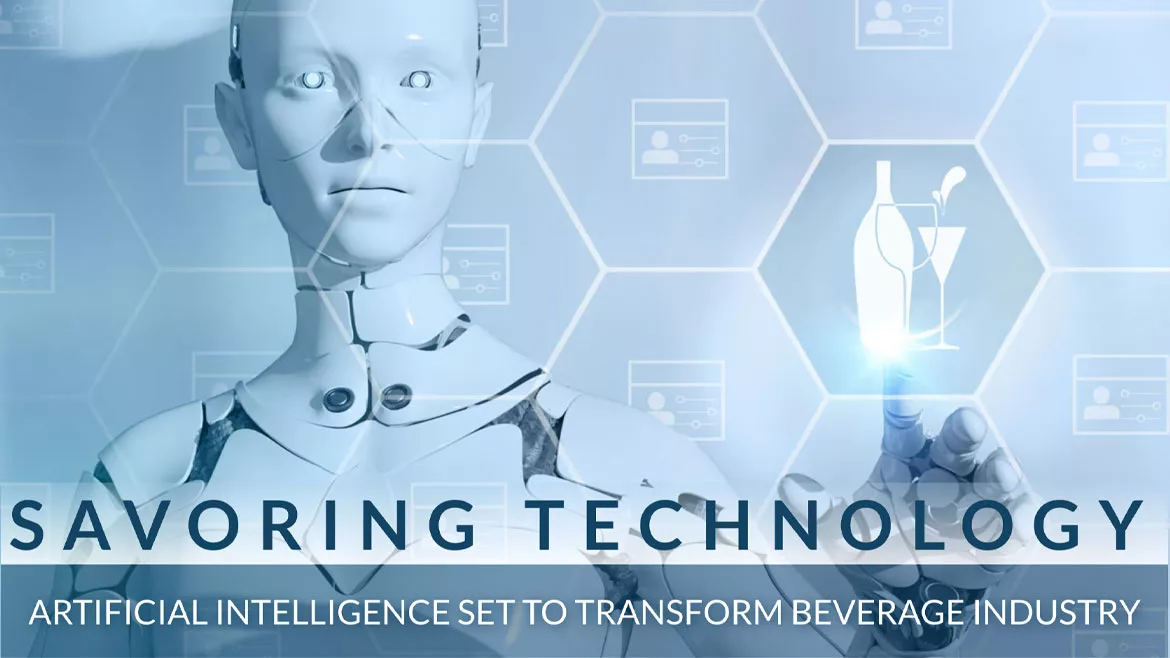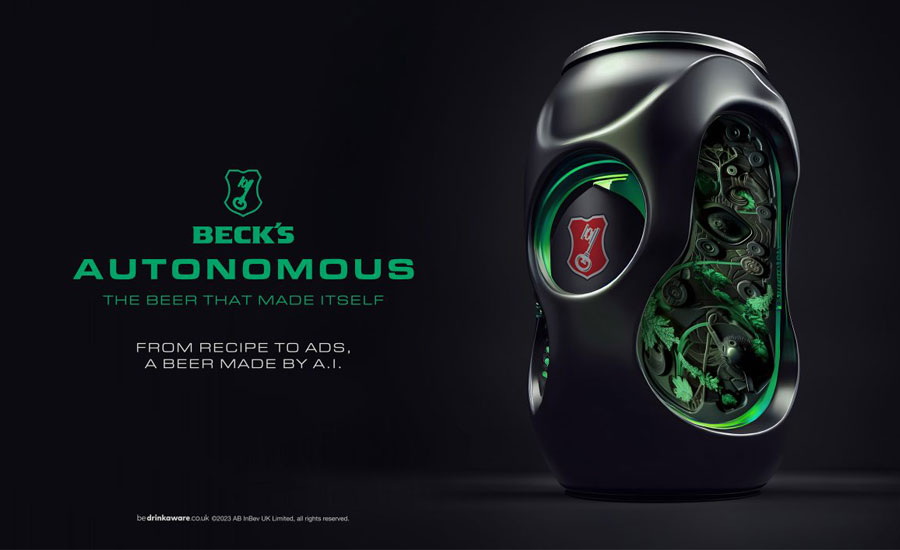Artificial Intelligence set to transform beverage industry
Augmented reality delivers immersive product experiences

Cover concept designed by Dana Knapp
Based on the nonfiction book Moneyball: The Art of Winning an Unfair Game, the 2011 film “Moneyball” is an account of the Oakland Athletics baseball team’s 2002 season and General Manager Billy Beane’s successful attempt at assembling a team on a lean budget by employing computer-generated analysis to acquire new players. Although the Athletics fare poorly early on in the season, ultimately, the team wins an unprecedented 20 consecutive games, setting the American League record.
Today, with the proliferation of artificial intelligence (AI) that enables computers and machines to simulate human intelligence and problem-solving capabilities, experts note that in recent years the technology has become a significant force across various sectors.
“In particular, generative AI, the type of AI designed to create new content, has been a topic of widespread discussion over the past two years,” says Thor Olof Philogène, CEO and co-founder of Stravito, Stockholm, Sweden. “Unlike traditional AI systems, which are typically programmed to perform specific tasks based on predefined rules or data, generative AI models are trained on large datasets and learn to generate new content by understanding patterns and relationships within the data.
“The thing about generative AI applications is that everybody wants magic,” he continues. “You see the technology, you let your mind wander, and suddenly it can do everything. But if we take a sober look at it, there are two main streams of value creation — efficiency and productivity.”
Philogène adds that, in Stravito’s case, generative AI technology can be turned into an easy-to-use and enjoyable tool, reducing the amount of time individuals at large organizations spend manually researching and finding insight, allowing business stakeholders to make more informed and better decisions faster.
“In fact, as part of our own work with generative AI, we recently announced Stravito Assistant, a trusted insights companion for large enterprises,” he says. “As a conversational tool, Assistant allows users to collaborate with the technology to find answers faster, ask better questions, and immediately leverage a wealth of insights to inform real-world business decisions.”
Nikolas Pearmine, chief strategy officer for London-based Black Swan Data, points to AI technology as impacting businesses at every level.
“ChatGPT was the first AI product to go mainstream. And as a result, some now view the possibilities of AI through the lens of Open AI’s tool,” he says. “But AI is impacting every department and level of business today — from hyper-personalized advertising strategies to supply chain optimization.
“Its potential to disrupt and improve systems and tasks is only going to increase as the technology — and our understanding of how to use it — matures,” Pearmine continues.
As an early innovator in applying AI to consumer intelligence, Pearmine explains that Black Swan Data’s technology uses Large Language Models (LLM) to identify and predict consumer behavior with 89% accuracy.
“[This] means brands can observe the real-time needs of millions of consumers, instead of surveying just a handful in a survey,” he says. “But as AI usage ramps up, insights, innovation and marketing leaders must interrogate the sources, quality and relevance of the data feeding the AI tools they are using.”
Yaron Benjamin, CEO of Aionic Digital, Washington, D.C., says that the most compelling advancement in AI is the sheer number of frameworks, tools and solutions that are being created daily.
“These tools are empowering people to leverage AI for increasingly complex decisions and predictions specific to their unique industry or domain,” he says. “We are seeing innovation being driven by subject matter experts, which is truly something that was simply not possible even a year ago.
“Augmented reality (AR) is another area where the combination of hardware and open source software is drastically changing the landscape of innovation and adoption,” Benjamin continues. “AR has evolved from a novelty into a powerful tool for enhancing human perception and interaction with the physical world. Improved hardware capabilities, such as better sensors and more powerful processors, have enabled AR devices to deliver immersive experiences with higher fidelity and lower latency.”
Further, Benjamin points to how the future of AR is closely tied to AI, particularly as it pertains to WebAR.
“Adoption in WebAR is quite astonishing, and its prevalence may not be apparent,” he says. “Think about the last Zoom call you were on. How many people created custom backgrounds, virtually raised their hand, or added some filter to mask their midweek exhaustion? The ability to provide face filters, changing color of hair or objects, background replacement, and simple 3D objects on just about any device regardless of hardware is not only useful in this new remote work era — it has become the norm.”
Benjamin adds that the common response to maturity in AR technology/advancement will always be hardware first, for example, “ergonomic-fashionable devices that are unobtrusive and fully immersive.”
Yet, as AI and AR continue to mature, Benjamin expects we will witness even more transformative applications and experiences.
“AI-powered algorithms are being integrated into AR systems to enable real-time object recognition, natural language processing, and contextual understanding, which enhance the interactivity and intelligence of AR experiences,” he explains. “From personalized shopping experiences to immersive training simulations, the synergy between AI and AR is driving innovation and unlocking new possibilities in a wide array of fields.
“As these technologies continue to mature, we can expect even more groundbreaking developments that reshape how we interact with and perceive the world around us,” Benjamin continues.

Pivotal technology for beverage brands
Currently, with its capability to uncover valuable consumer insights, experts highlight the role AI technology plays within the beverage industry.
“With its heavy reliance on qualitative data, the beverage industry is in a unique position to expedite consumer-centricity and impactful decision-making across the organization through the enhanced access to insights offered by new generative AI solutions,” Stravito’s Philogène says. “From the perspective of consumer insight, democratized access to consumer insights within the organization is crucial, and can be catalyzed by the capabilities of generative AI tools.
“By reducing the time spent on manual research, generative AI opens up operational bandwidth for deeper analysis, implementation and action,” he continues. “This is particularly vital for beverage brands seeking to remain at the forefront of trends and intimately connected with their consumers.”
Aionic’s Benjamin explains how AI can guide decision-making and drive innovation in the industry by analyzing factors such as purchasing habits, social media interactions, and demographic information.
“In today’s digitally dominated landscape, consumers aren’t just after products — they crave personalized experiences that resonate with their distinct tastes and preferences,” he says. “By analyzing vast amounts of data from social media, online reviews and purchasing patterns, AI algorithms can identify emerging flavor profiles, ingredient combinations, and consumption habits that appeal to specific demographics. By leveraging AI algorithms on vast amounts of datasets, beverage-makers can identify trends, patterns, and consumer behavior in a way that was previously not possible.”
Black Swan’s Pearmine points to how AI can help turn unstructured social data, like Instagram posts, Reddit feeds and product reviews into actionable consumer insights.
“In our case, it has three core functions — the 3Fs,” he says. “Finding trends within millions of social and online consumer dialogues. Filtering out irrelevant content and noise. And forecasting the future growth of trends.
“It enables our customers to make more scientific decisions along the insights and innovation process,” Pearmine continues. “They know what trends to prioritize, why they should activate them and when to act.”
Aionic’s Benjamin notes that with advancement in technology and common knowledge of AI, specifically machine learning (ML), beverage-makers can accurately predict demand, develop personalized offerings, and drastically enhance marketing strategies.
“There are many big players actively doing this today,” he says. “Starbucks, for example, uses AI-powered personalization and ML to help drive brand loyalty, push customer engagements in extremely unique ways, and incentivize consumers to spend more and visit more often.”
Going above and beyond
As AI represents groundbreaking tools with transformative potential for the beverage industry, experts highlight how the technology goes far beyond just offering consumer insights.
Aionic’s Benjamin points to how AI can assist in the research and development process by generating recipe ideas, optimizing flavor combinations, and predicting ideal conditions for brewing or distillation.
“These possibilities streamline the product development cycle and open up new avenues for experimentation and creativity,” Benjamin says. “… In addition to helping with recipe ideas and flavor combinations, AI algorithms can analyze data on ingredient profiles, market trends, and consumer preferences to inform the formulation of new or improved beverage products.
“AI can also help tweak nutritional profiles of mainstream beverages,” Benjamin continues.
“By leveraging AI across various aspects of their operations, beverage-makers can drive innovation, optimize processes, reduce costs, and ultimately, enhance customer experiences.”
Black Swan’s Pearmine points to how AI is being used in new product development (NPD) — from start to finish.
“In Venture Beat’s article, Stephan Gans, chief consumer insights and analytics officer at PepsiCo explained how AI is being applied across the end-to-end NPD process,” he says. “It’s used in the manufacturing of a new product, helping to significantly improve efficiencies and reduce water consumption.
“Sales and marketing teams are also using AI to create personalized digital and in-store ads,” Pearmine continues. “All branded materials and campaign assets are being quality control checked by an AI-powered tool. It’s quickly becoming a key feature of every step of the new product journey — from ideation to consumption.”
Aionic’s Benjamin points out that, although AI has so many applications, when it comes to classic machine learning alone, most beverage-makers already use AI to support supply chain optimization.
“Predictive analytics can help forecast demand, optimize inventory levels, and streamline logistics to maximize efficiencies, reduce waste and minimize cost,” he says. “AI can even automate negotiations with suppliers, handle delivery requests and process orders through AI-powered tools.
“AI can also assist beverage manufacturers with quality control and assurance,” Benjamin continues. “With advancing technologies in machine vision and AI-enabled sensors, AI can monitor the production process and catch defects, inconsistencies or contamination in real time. By automating quality control tasks, beverage-makers can ensure product consistency, safety and compliance with regulatory standards.”
Benjamin adds that by utilizing AI-driven predictive maintenance, beverage manufacturers can significantly reduce maintenance costs by predicting equipment failures and scheduling maintenance only when necessary.
“By implementing predictive maintenance systems, beverage-makers can minimize downtime, prolong equipment lifespan, and optimize maintenance schedules to ensure uninterrupted production processes,” he explains.
Stavito’s Philogène says that one of the greatest potentials of incorporating generative AI into beverage companies centers on enhanced efficiency, productivity and creativity for employees and team members.
“This comes from removing manual information-gathering work, and making it easier for users to discover new information through a simplified, conversational interface made possible by generative AI technologies,” he explains.
However, Philogène says it’s important to bear in mind that generative AI still is in its early stages of development, which is why beverage industry executives need to do thoughtful research and education.
“Beverage companies need to identify real-life pain points that generative AI tools can effectively address,” he explains. “Implementing generative AI simply for the sake of using the technology without a clear purpose may lead to inefficient resource allocation and a limited return on investment.”
Judging the options
Although AI seems to present unlimited potential, from offering consumer insights to enhancing beverage development to supply chain optimization, experts weigh in on the pros and cons of utilizing AI solutions.
“Let’s begin with the benefits,” Black Swan’s Pearmine says. “AI tools have significantly increased the speed and ease of understanding consumers. You no longer have to wait for consumers to answer your questions. Or even ask questions in the first place.
“It’s powering a more observational approach that’s free from biases like the ‘say-do’ gap,” he continues. “Gaps in data and knowledge are being plugged to aid better decision making along the NPD process. Brands are no longer guessing which new flavor to launch, ingredient and benefit claim to include, or how to talk about these in the voice of the consumer.”
Yet, Pearmine warns that the accuracy of these insights remains heavily reliant on the underlying quality of data powering the AI. “Most users don’t know what dataset their insights originate from,” he says.
Additionally, Pearmine notes that the dangers of LLMs providing confident but false recommendations is well documented.
“So if you don’t know the source of data, then an AI is no more valid than another person’s opinion,” he explains. “That’s why data quality is paramount at Black Swan. Over 10 years, we’ve created standards to ensure our trend predictions are highly accurate.
“Using AI to get innovation decisions right nine times out of 10 is genuinely game-changing,” Pearmine continues. “It’s enabling our customers like PepsiCo, Welch’s and General Mills to launch successful new products to market more often, and win with consumers in an increasingly crowded space.”
Stravito’s Philogène believes that there is a major opportunity in using generative AI technology because of its ability to support and enhance human expertise.
“Implementing generative AI solutions can provide companies with more power and speed to parse large volumes of data and insight, delivering a great productivity boost, and promoting exploration and inspiration through a seamless interface,” he says. “However, the challenges of incorporating generative AI into systems are multi-dimensional: enterprises need to make sure they only work with trusted vendors for their AI solutions and that the data that they use in AI-enabled systems is handled in a secure and compliant manner.”
Moreover, Philogène points to the risk of hallucinations from some generative AI tools.
“For beverage companies that are reliant on market and consumer research to make business decisions, it’s pivotal that any tool they implement only uses vetted data to generate AI-enabled answers, unlike open AI apps that pull from the public domain,” he explains. “Furthermore, I would stress that you, when it comes time to integrate, ensure that the generative AI tool is complemented by a human-run service layer. Implementing generative AI requires a human component to ensure its effectiveness.”
Aionic’s Benjamin considers both AI and AR to be revolutionary tools, with the potential to transform the beverage industry. “However, to harness these technologies effectively, expertise is paramount,” he says.
Furthermore, Benjamin points to expertise as critical for navigating the ethical considerations inherent in AI and AR deployment.
“From ensuring transparency to mitigating algorithmic bias, knowledgeable professionals play a vital role in safeguarding both consumer trust and brand reputation,” he says. “For example, beverage-makers must navigate and comply with relevant regulations surrounding data privacy, advertising, and consumer protection when leveraging AI and AR technologies. This requires robust data security measures to protect consumer information.”
In summarizing, Benjamin reiterates that, although AI and AR offer immense potential for innovation in beverage development and brand engagement, successful implementation hinges on expertise and thoughtful execution.
“Companies that invest in skilled professionals capable of understanding the nuances of these technologies — whether as in-house experts or external partners — stand to gain a competitive edge, driving growth and differentiation in an increasingly digital marketplace,” he concludes.
Looking for a reprint of this article?
From high-res PDFs to custom plaques, order your copy today!






